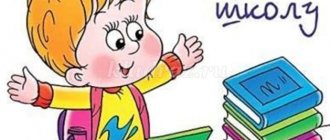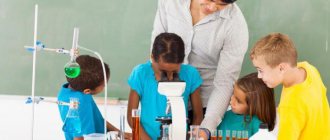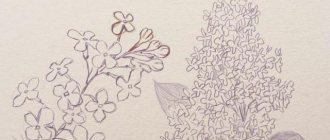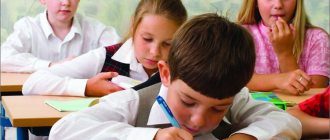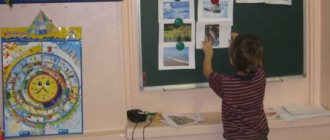Summary of the educational activity “Soon to school” for children of the preparatory group for school
Summary of a lesson on preparing for school in a preparatory group for school.
Author: Vera Valerievna Pavlova, teacher of the special group of the Municipal Educational Institution “Bendery Kindergarten No. 9”, Bendery Abstract: these tasks will help teachers when consolidating the lexical topic “School”; the tasks will also be useful to parents. Program content: Generalization of ideas about school and school supplies. Expansion, clarification, updating of the dictionary on the topic “School. School supplies." Improving the grammatical structure of speech, strengthening the skills of syllabic analysis of words, skills of composing and reading words. Automation of correct pronunciation and differentiation of all previously delivered sounds in free speech activity. Development of coherent speech, all types of perception. Developing skills of cooperation, activity, initiative, and independence. Formation of readiness for school. Materials: a set of cards for the game “fourth wheel” for each child; a set of numbers for each child; proverbs about school; a set of pictures with school supplies for each child; number houses for each child. Educator: “Guys, look how many guests came to our lesson. Let's greet them: “Invented by someone simply and wisely When meeting, say hello “Good morning!” " “Good morning” to the sun and birds “Good morning” to smiling faces And everyone becomes kind and trusting. May good morning last until evening. Soon you will all go to school. And today each of you can test yourself - what he has already learned. We will complete tasks, and start with a warm-up ! In order for a vehicle to move, it must be started, and in order to start it, it must be prepared. So is our mouth. In order to speak well, and then we will need to talk, we need to do exercises for the tongue. - "Door" . The driver opens the door (open mouth wide), closes it (close). Repeat 3 times. - “Spatula” . The driver sat down with his tongue in the car and looked forward (open his mouth and put his wide tongue on his lower lip, hold it). - “Watch” . The driver decided to wipe the glass and turned on the wipers (open his mouth and move the tip of his tongue from one corner of his mouth to the other). - "Woodpecker" . The driver turned the key, but the engine was still cold and not ddddddd (open your mouth slightly and clearly pronounce ddddd). - "Motor" . Finally the engine warmed up and started rrrrrrrrr (growl). Breathing exercises “The wind inflates the sails” Children are asked to blow on a napkin - the wind inflates the sails. Offer to try different strengths of wind - breathing. Answer “yes” or “no” - quickly: Are there nuts in the empty glass? Do the leaves turn yellow in spring? Is an ant an insect? Does a calf have 4 legs? Is a cucumber red? Is a tiger a predator? Is a sparrow a migratory bird? Are there 12 months in a year? Is March a winter month? Does the zucchini look like an oval? Is there dinner in the morning? Is chanterelle an edible mushroom? “Complete the proverb and explain its meaning.” Knowledge is not a burden to anyone. Learning to read and write is always useful. Business before pleasure. The world is illuminated by the sun, and man is illuminated by knowledge. -What are these proverbs about? (About learning, about work) -Where do children study? (At school.) -What do children learn at school? (Read, write.) -You are preparing for school. That’s why our group is called a school preparatory group. You have learned a lot during this time. Remember how you learned to find related words. Strengthening word formation skills. Game “Family of Words” Choose related words to the word school . When you go to school what will you be? ( schoolchildren ) Christina, who will you be? ( as a schoolgirl ) -And Dima? ( as a schoolboy ) What do they call you now? ( by preschoolers ) What are the names of the items that a schoolchild needs? ( school ) What is the name of the site that is attached to the school? ( school )
Educator: What do you think schoolchildren should be like? Children: Curious, hardworking, neat, cultured, diligent, sociable, well-mannered, responsive. Educator: I think that you will demonstrate all these qualities and show them at school. What kind of teacher should a teacher be? Children: Strict, talented, loving children, demanding, intelligent, cultured, decent, responsible, responsive. - That's right, today in class we will talk about school and school supplies. – What other school supplies do you know? (Brush, paints, notebook, album, textbooks, ruler, eraser, plasticine, bell, chalk.) - A metal bell - a bell, what kind? (Metal). And what else? (Resonant, ringing, brilliant.) - Notebook made of paper - what kind? (Paper) And what else? (Green, thin, checkered, lined.) - And what kind of pencil? (Wooden, sharp, dull, thick, thin, colored, simple, multi-colored, double-sided, if the pencil is very small, then it’s a pencil.) - What kind of pencil case? (Plastic, wooden, roomy.) - Plastic handle - plastic, what else? (Red, green, blue, thick, thin.) - Rubber eraser - eraser, which one? (Rubber, hard, soft.) - Leather briefcase, - what kind of briefcase? (Leather.)
- Well done, guys, you make up sentences well, but there are children who don’t know how to make up sentences, so listen and correct the sentence “Nonsense . 1. The brush painted Lena. (Lena painted with a brush.) 2. A textbook to learn from Vasya. (Vasya study from the textbook.) 3. Vova put the pencil case in his briefcase. (Vova put the pencil case in his briefcase.) 4. The pen wrote a letter to Tanya. (Tanya wrote a letter with a pen.) 5. Olya reads the ABC. (Olya reads the alphabet.)
Game "Transformation" If you went to school, then you became.... (schoolchildren, students) If you walk along the street, then you (pedestrians). If you come to the theater, then you (the audience). If you come to the store, then you (buyers). If you come to the doctor, then you (the patient).
Finger gymnastics If your fingers are sad, they want kindness. We press our fingers tightly to our palms. If our fingers cry, someone has offended them. we shake our hands, we will take pity on our fingers - we will warm you with our kindness. We “wash” our hands, breathe on them. We will press our palms to ourselves, one at a time, 1 at the top, 1 at the bottom. Let's start stroking gently. we stroke the palm with the other palm. Let the palms hug, let them play a little. cross your fingers, palms press the fingers of both hands quickly lightly tap each finger you need to take and hug tightly. We hold each finger in a fist - Guys, you need to pack your school bag . Task: - There is a round sharpener in the lower right corner. — There is a triangle in the upper left corner. — There is a rectangular notebook in the lower left corner. — There is a square pencil case in the upper right corner.
Game "Be careful!" (With numbers) • Remove the number that indicates how many eyes the traffic light has. • Remove the thinnest number! • Remove the number that tells you how many legs the kid has. • Remove the number that looks like a poker! • Remove the number that consists of two bagels. • Remove the number that comes after 5. • Remove the number that can turn into the number 6. Didactic game “Settled in the Houses.” Q: In this task you need to populate number houses. Take number houses and everyone completes the task independently. Solve problems - jokes • Two girls went for milk and met one girl with milk. How many girls went for milk? • The rooster laid 5 eggs, then another. How many eggs did the rooster lay in total? • A small, small tree grows in a deep, remote forest. It has 6 branches. There is 1 bird on each branch. How many branches are there on a tree? • Mom has 3 flowers in her hands. She bought 2 more. How many fingers does mom have on 2 hands? “Look at the syllables - you will find three words in them!” GA TET SCHOOL FOR RADI LA KNI Dynamic pause “Physical education.” What is physical education? — Training and game (march on the spot). What is physical education? Hands down is “physical”, Twisting your neck like a steering wheel is “kul”, Jump deftly in height is “tu”, Run for half an hour in the morning is “ra”. Do this thing - (arms to the sides, up, forward) - You will be dexterous (crouched - arms forward), strong (stood - arms to the sides), Brave (hands on the belt), Plus - excellent figure (showed) - This is what it means physical training ! (showed with thumb up). Game “Answer - don’t yawn” In what month do children go to school? (September.) What is the break between lessons called? (Change.) What is the name of the school bag? (Portfolio.) How many seasons are there in total? (Four.) What is the name of the notebook for recording homework? (Diary.) How many days are there in a week? (Seven.) What is the name of the building where the children study? (School.) The white pebble melted and left marks on the board. What is this? (Chalk) A globe the size of a ball. ( Globe.)
“Dividing words into syllables” (clapping) Vase, bus, duck, car, watermelon, cabbage, pumpkin, dog, soap. Educator: The next task is “The Fourth Wheel” . Determine what is superfluous in this picture and prove why? (Cards for classifying objects are shown) - And now it’s our turn to play the game “On the contrary” • The soup is hot, but the compote is cold • Sugar is sweet, and pepper is bitter • A sheet of emery is rough, but a sheet of paper is smooth • Tea is hot, but ice cream is cold • It’s light during the day and dark at night • The hare runs fast, but the turtle crawls slowly • The grandson is young, and the grandfather is old • The plasticine is soft, and the stone is hard • The lion is brave, and the hare is cowardly • The house is high, and the garage is low • The weather is cold in winter, and in summer hot •The road is wide, but the path is narrow •The fluff is light, but the stone is heavy •The jelly is thick, but the fruit drink is thin Game “Yes or No” 1. Children go to school to play with toys. 2. A teacher is a person who learns. 3. A student is a child who is learning to read and write. 4. An excellent student is one who receives “twos”. 5. A pencil case is needed to store pencils and pens. 6.You need a backpack to carry sandwiches to school. The child recites the poem “What is school?” School is a bright house, We study, we will be in it. There we will learn to write, add and multiply. At school we learn a lot: About our beloved land, About mountains and oceans, About continents and countries; And where the rivers flow, And what the Greeks were like, And what the seas are, And how the earth turns. There are workshops at school... There are countless interesting things to do! And the call is fun. This is what “school” means!
We recommend watching:
Raising interest in school in children of the preparatory group Teaching literacy to children 5-6 years old Advice for parents of future first-graders Summary of a comprehensive lesson on preparing children 6-7 years old for school
Similar articles:
Learning the alphabet with preschoolers in kindergarten
Children's perception of information
Fatigue and overwork in preschool children
Educational coloring books for children from 3 to 5 years old
Excursion for preschoolers to school
MAGAZINE Preschooler.RF
Municipal budgetary preschool educational institution “Kindergarten of a general developmental type with priority implementation of activities in the cognitive and speech direction of children’s development No. 63 “Zhemchuzhinka” Lesson summary for the school preparatory group “Soon to school” Prepared by: teacher Talipova A.N. Naberezhnye Chelny. year 2014Topic: “Soon to school” Age: 6-7 years, preparatory group. Integration of educational areas: social - communicative, cognitive development, speech development, physical development. Objectives: - educational: FEMP - consolidate forward and backward counting skills; - strengthen children’s ability to count within ten, the composition of numbers; - consolidate children’s knowledge of names, the sequence of days of the week, and the ability to name adjacent numbers; -solve examples of addition and subtraction; - consolidate knowledge about geometric shapes; - strengthen the ability to navigate on a sheet of paper. Literacy training - continue to teach children the ability to divide words into syllables and name them; -learn to compose sentences according to a given pattern, determine the order of words in a sentence; - consolidate the ability to find words based on given sounds, determine its place in a word (beginning, end, middle), and highlight it when pronouncing it. Developmental: develop logical thinking, imagination, memory; self-esteem skills and mutual assistance. Educational: - cultivate perseverance, patience, interest in mathematics and literacy; - cultivate friendly relations between children. Methodical techniques: game (game - travel); visual (use of pictures, didactic games); verbal (reminder, instructions, questions, individual answers from children); encouragement, lesson analysis. Demonstration material: a playing field with a picture of a kindergarten and a school; along the route from kindergarten to school, tasks are given in rectangles that must be completed; ball, sentence diagram, number series, drawings. Handouts: red and yellow stars, numbers, number houses, pencil cases with numbers for each child Organization of children: in a circle, at tables; & Individual work: consolidate knowledge of the composition of the number 7 from Diana, cultivate endurance from Nazar. Preliminary work: problem solving, individual work. Structure: 1. Organizational moment - 1 task - warm-up. 2. Work on the topic of the lesson: - 2nd task “Find a place in a row” - 3rd task “Settled in the houses” - 4th task Physical education - 5th task “Sounds and syllables” - 6th task “Enchanted sentence” - 7th task “Route diagram”. 3. Summary of the lesson.
PROCEDURE: V.: Guys, let's stand in a circle, hold hands, smile and remember our poem - greeting. In a wide circle, I see, all my friends have stood up. We will now go to the right, And now we will go to the left, We will gather in the center of the circle, And we will all return to our place. Together we will be very friendly Answering questions We all want to study, We all want to know a lot. V.: Guys, we have guests today, let’s greet them, smile and give them our good mood. What games do you like to play? Children's answers. V.: And I suggest you play the game “Soon to school.” Today each of you can check what he learned in kindergarten. In front of you is a playing field depicting a kindergarten and a school. We need to cover the distance from kindergarten to school by completing assignments. But before leaving, you need to determine the location of the kindergarten. Children: - In the upper left corner. Q: - who can tell where the school is located on the playing field? Children: - In the lower right corner. V.: Well done! We determined the correct location for the kindergarten and school. So, let's start the game. What task do you think we will do first? 1 task “Don’t yawn – answer questions quickly!” (with a ball) 1. What time of year is it now? 2. What day of the week is it today? 3. What day of the week will it be tomorrow? 4. What day of the week was yesterday? 5. How many days are there in a week? 6. What is the name of the fifth day of the week? 7. What are the “weekend” days of the week called? 8. Name the neighbors of the number five. 9. Name a number less than seven. 10. Name a number greater than four. 11. Name a number greater than seven but less than nine. V.: Well done! You completed the first task. And to complete the following tasks, we take places at the tables. Task 2. Didactic game “Find a place in a row.” V.: Guys, look at the number series. Here all the numbers are mixed up and you need to restore order in the number series. Children come up one by one and put the numbers in the correct order. V.: And you coped with this task. What task will we do next? 3 task. Didactic game “Settled in the houses.” Q: In this task you need to populate number houses. Take number houses and everyone completes the task independently. After completing the task, one child completes it on the board. V.: Well done, let’s move on and see task 4 before us. It's called "Get Healthy." Guys, what improves your health? Children: Gymnastics. V.: Correct. Let's conduct physical education. We use our feet to stomp and stomp. We use our hands to clap-clap. We are eyes blink-blink We are shoulders chick-chick. One-two, one-two, it’s time for us to get busy! One here, two there, turn around! Once, they sat down, twice, they stood up. They all raised their hands up. V.: Well done! We rested a little and improved our health. Let's continue our game. Task 5. "Sounds and syllables." V.: In this task you need to determine the place of the sound in the word. Take the sound tracks, I will name the words, and you must determine the place of the sound in the word: at the beginning, in the middle or at the end. 1. -[a] - book, crayfish, saw, bag, orange. - [t] - cake, phone, kitten, Teacher: well done, now listen to the next task. 2. “Dividing words into syllables” (clapping) Vase, bus, duck, car, watermelon, cabbage, pumpkin, dog, soap. Educator: And you completed this task. Task 6. "The Enchanted Proposal." Look at the board, what do you see? (sentence diagram). - How many words are in this sentence? (3) -make sentences using diagrams and pictures. Educator: Well done! - Now let's draw our entire route. Draw in the lower right corner - a rectangle (school) In the lower left corner - an oval In the lower right corner - a circle In the center - a triangle In the upper left corner - a square (kindergarten). V.: Guys, you completed all the tasks and covered the path from kindergarten to school. Now we make sure that everyone has the necessary knowledge to do well in school. Result: Q: — Which tasks seemed the most interesting? Milena? Leila? — Which task did you find most difficult? — What did Nazar like most? — I liked how you all worked together and actively today. And for good work, everyone will receive stars - those who think they did a great job in class take a red star, and those who think they need to work out a little take a yellow star.
| Next > |
